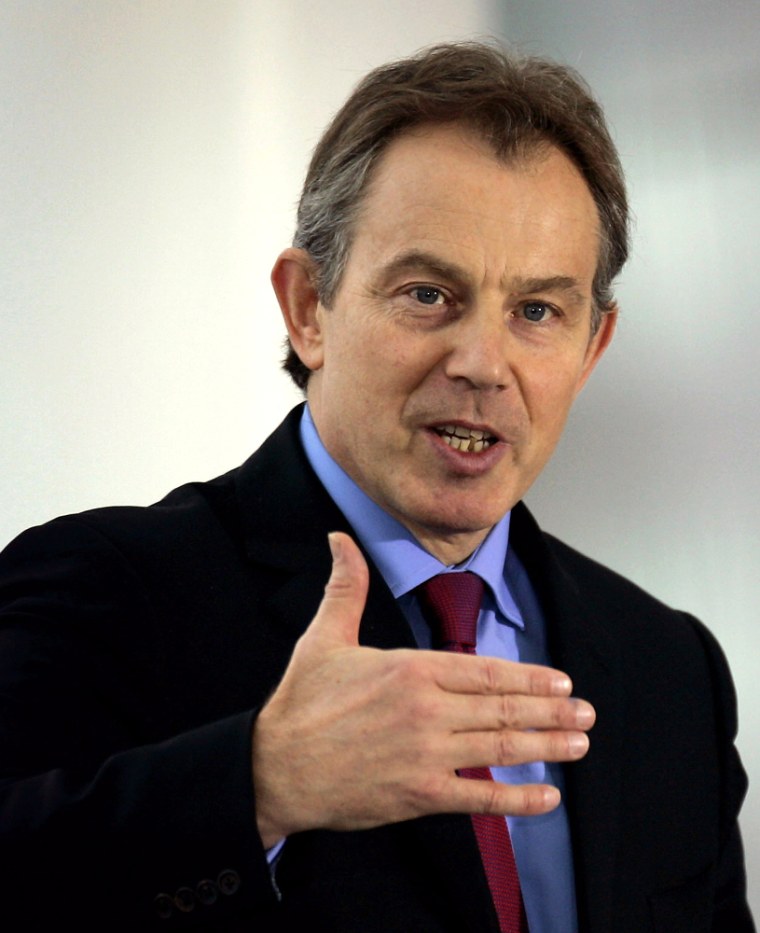British Prime Minister Tony Blair is trying to involve the United States in a new international treaty on global warming, The Times newspaper reported Thursday.
It said Blair had held lengthy discussions with President Bush over a fresh initiative that would bypass Washington’s opposition to the Kyoto Protocol, which relies on mandatory curbs of greenhouse gases.
“It is being given the highest priority,” a Downing Street source was quoted as saying. “There is an awful lot of work going on in the background on this.”
Blair has pledged to make a climate change priority for Britain's presidencies of the Group of Eight and European Union next year. And he will be hosting Bush and other G8 leaders at a summit next July.
A Downing Street spokesman contacted by Reuters would not confirm the report, but said Blair had held talks with U.S. Senator John McCain, R-Ariz., on the issue of climate change last week.
President Bush withdrew the United States from the Kyoto pact, which will go into effect in February after Russia ratified it in November.
A source cited by The Times described Blair's plan as “Kyoto-lite," saying signatories would agree on the scale and nature of the threat and endorse an international program to develop technologies reducing carbon emissions and promoting renewable energy like wind and solar power.
The United States, along with Australia, is the biggest industrialized country to reject the accord, a landmark agreement obligating 30 of the world’s developed nations to reduce their output of heat-trapping gases produced by industry, automobiles and power plants.
Many scientists believe that fossil fuel emissions of the gases seriously threaten life on Earth by causing a gradual rise in the planet’s temperature. Global warming has been blamed for more violent storms, rising sea levels and shrinking animal habitats.
U.S. dares others to 'match us'
In international climate talks this week in Buenos Aires, Argentina, the United States has been emphasizing that it spends billions of dollars seeking new technologies to cut emissions.
Harlan Watson, a U.S. climate negotiator, insisted the Bush administration was aggressively seeking ways to limit U.S. output of harmful emissions, arguing investments in cleaner energy was the best strategy.
“We match or exceed what any other country is doing to address the issue,” he said. “I would challenge any of the Kyoto parties to match us both internationally and domestically.”
Watson said the Bush administration was planning to spend more than $5 billion annually researching climate change and the development of new cleaner fuels and ways to manage and store carbon dioxide, the leading greenhouse gas.
The United States has also decided to implement its own voluntary carbon dioxide emissions. President Bush opposes mandatory emissions controls, saying they could cost jobs and damage the economy.
The U.S. stance, which has rankled European allies, hung over the annual United Nations gathering. Government policy-makers and environmental groups from nearly 200 nations are looking at ways to address global warming even beyond 2012.
U.S. officials have said they want to use the conference to highlight Bush administration efforts to develop cleaner energy technologies and ways to capture and safely store carbon dioxide.
“I’m not sure why we’re considered the ’bad boys’,” Watson said. “Much more focus ought to be put on actions,” not the commitments posed in the protocol, he said. “Kyoto was a political agreement. It was not based on science.”
Tough road ahead
Developing countries, facing possible emissions controls for the first time after 2012, also have resisted opening talks about the “post-Kyoto” future — another focus of the meeting.
However, Raul Estrada, an Argentine negotiator who chaired the 1997 United Nations conference where the protocol was negotiated, said international efforts to confront global warming would be limited without stronger U.S. involvement.
“Of course, to be more effective, you need to have the United States in,” he said, pointing out that the United States is responsible for one-quarter of the world’s emissions.
Under the Kyoto treaty, governments pledged to set limits on emissions by industrial nations.
Over the next eight years, the European Union, for example, would reduce emissions of carbon dioxide and other greenhouse gases by 8 percent below 1990 levels, Japan by 6 percent, and the United States by 7 percent.
Although the Bush administration rejects Kyoto, northeastern U.S. states are moving toward capping carbon dioxide on their own and allowing emissions trading. California also has acted to sharply reduce auto emissions.
